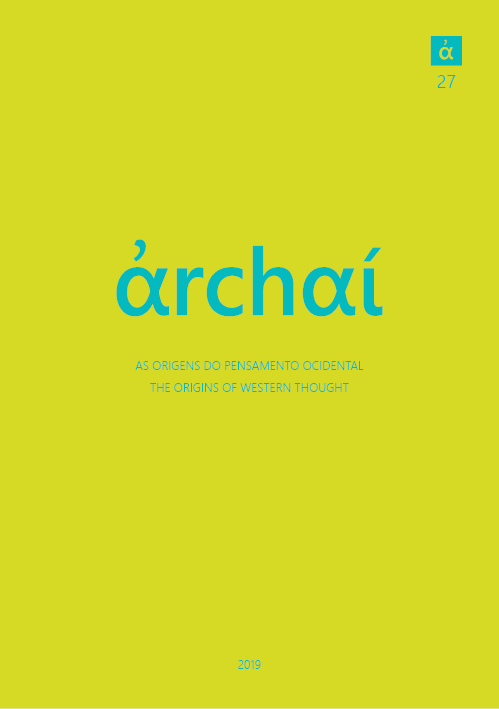Anaxarchus of Abdera
Adiaphoria and Criterion of Truth on the Threshold of Hellenistic Age
Keywords:
criterion of truth, indifference, happiness, epistemology, HellenismAbstract
The philosophical doctrine of Anaxarchus of Abdera is nowadays not very well known. This notwithstanding, Anaxarchus was a character of key importance in the development of Hellenistic philosophy. His ethics, in particular, is one of the first theories in stating that the ultimate goal of life is happiness (the so-called eudaimonism). Moreover, he suggests that the only way to reach that goal is adiaphoria, i.e. ‘indifference’. However, the sceptic interpretation of adiaphoria as denial of the criterion of truth will turn Anaxarchus into a figure not related to sceptic thought, from the point of view of the sceptic philosophers themselves. The purpose of this paper is to analyse the way how Hellenistic and Roman tradition construed the role of Anaxarchus’ eudaimonia and the place of this author in the development of thought in this period.
Downloads
References
BRUNSCHWIG, J. (1993). The Anaxarchus Case: An Essay on Survival. Proceedings of the British Academy 82, p. 59-88.
CALVO MARTÍNEZ, T. (1994). El pirronismo y la hermenéutica escéptica del pensamiento anterior a Pirrón. In: MARRADES MILLET, J.; SÁNCHEZ DURÁ, N. (eds.). Mirar con cuidado. Filosofía y escepticismo. Valencia, Universidad de Valencia, p. 3-19.
DECLEVA CAIZZI, F. (1980). Democrito in Sesto Empirico. In: ROMANO, F. (ed.). Democrito e l’Atomismo Antico. Atti del Convegno Internazionale, Catania 18-21 aprile 1979 (Siculorum Gymnasium 33, n. 1). Catania, Universitá di Catania, p. 393-410.
DECLEVA CAIZZI, F. (1981). Pirrone Testimonianze. Napoli, Bibliopolis.
DECLEVA CAIZZI, F. (1984). Pirrone e Democrito. Gli atomi: un mito? Elenchos 5, p. 5-23.
DEICHGRAEBER, K. (1965). Die griechische Empirikerschule: Sammlung der Fragmente und Darstellung der Lehre. Berlin, Weidmann. (1ed 1930)
DORANDI, T. (1994). I frammenti di Anassarco di Abdera. Atti e Memorie dell’Accademia Toscana “La Colombaria” 59, p. 9-60.
DOTY, R. (1992). The Criterion of Truth. New York, Peter Lang.
FLINTOFF, E. (1980). Pyrrho and India. Phronesis 25, p. 88-108.
FLORIDI, L. (2002). Sextus Empiricus. The Transmission and Recovery of Pyrrhonism. Oxford/New York, Oxford University Press.
FRENKIAN, A. M. (1958). Der griechische Skeptizismus und die indische Philosophie. Bibliotheca classica Orientalis 4, p. 211-250.
GOEDECKEMEYER, A. (1968). Die Geschichte des griechischen Skeptizismus. 2ed. Aalen, Scientia Verlag. (1ed. 1905)
HANKINSON, R. J. (1995). The Sceptics. London, Routledge.
IOPPOLO, A. M. (1980a). Anassarco e il cinismo. In: ROMANO, F. (ed.). Democrito e l’Atomismo Antico. Atti del Convegno Internazionale, Catania 18-21 aprile 1979 (Siculorum Gymnasium 33, n. 1). Catania, Universitá di Catania, p. 499-506.
IOPPOLO, A. M. (1980b). Aristone di Chio e lo stoicismo antico. Napoli, Bibliopolis.
KANAYAMA, Y. (1989). Pyrrho and adiaphora pragmata. Journal of Classical Studies 37, p. 56-66.
LONG, A. A.; SEDLEY, D. (1987). The Hellenistic philosophers. Vol. 2: Greek and Latin texts with notes and bibliography. Cambridge, Cambridge University Press.
O’KEEFE, T. (2011). The Cyrenaics vs. the Pyrrhonists on Knowledge of Appearances. In: MACHUCA, D. E. (ed.). New Essays on Ancient Pyrrhonism. Leiden/Boston, Brill, p. 27-40.
O’KEEFE, T. (2018a). Anaxarchus on Indifference, Happiness, and Convention. In: WOLFSDORF, D. (ed.). Early Greek Ethics. Oxford, Oxford University Press, (forthcoming).
O’KEEFE, T. (2018b). Anaxarchus. Internet Encyclopedia of Philosophy. Available at http://www.iep.utm.edu/anaxarch/. Accessed in 26/04/2018.
PIANTELLI, M. (1978). Possibili elementi indiani nella formazione del pensiero di Pirrone di Elide. Filosofia 29, p. 135-164.
STOUGH, C. L. (1969). Greek Scepticism: A Study in Epistemology. Berkeley, University of California Press.
TSOUNA, V. (1998). The Epistemology of the Cyrenaic School. Cambridge, Cambridge University Press.
VOGT, K. M. (1998). Skepsis und Lebenspraxis. Freiburg, Karl Alber.
WARREN, J. (2002). Epicurus and Democritean Ethics: An Archaeology of Ataraxia. Cambridge, Cambridge University Press.
Downloads
Published
How to Cite
Issue
Section
License
Given the public access policy of the journal, the use of the published texts is free, with the obligation of recognizing the original authorship and the first publication in this journal. The authors of the published contributions are entirely and exclusively responsible for their contents.
1. The authors authorize the publication of the article in this journal.
2. The authors guarantee that the contribution is original, and take full responsibility for its content in case of impugnation by third parties.
3. The authors guarantee that the contribution is not under evaluation in another journal.
4. The authors keep the copyright and convey to the journal the right of first publication, the work being licensed under a Creative Commons Attribution License-BY.
5. The authors are allowed and stimulated to publicize and distribute their work on-line after the publication in the journal.
6. The authors of the approved works authorize the journal to distribute their content, after publication, for reproduction in content indexes, virtual libraries and similars.
7. The editors reserve the right to make adjustments to the text and to adequate the article to the editorial rules of the journal.



